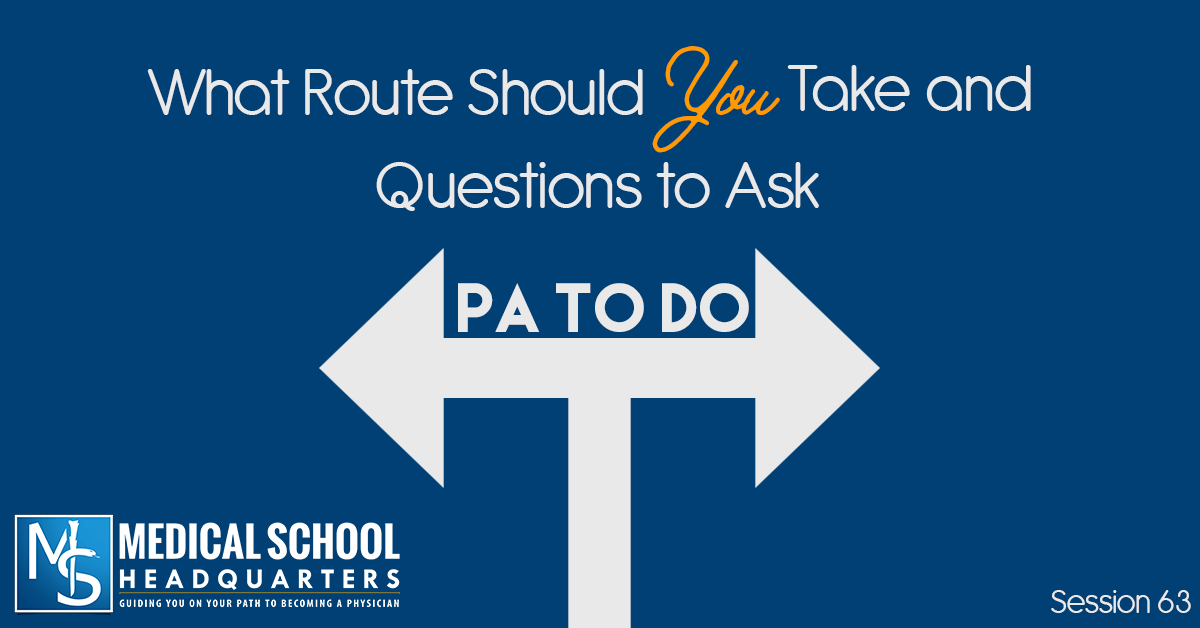Apple Podcasts | Google Podcasts
Going From Physician Assistant to Medical Doctor

In today’s episode, Ryan talks with Dr. Mark Kauffman, the Assistant Dean of Graduate Studies at Lake Erie College of Osteopathic Medicine (LECOM), who was previously a PA.
If you’re a student struggling with the decision of whether you should be a doctor, go to medical school and give up 4 years of your life, 3 years of residency, plus the debt that comes with it, versus taking a PA program and then going straight out in the workforce with less debt, then this episode is for you.
Learn from Mark as he made his leap from being a PA to going to medical school, then working at LECOM, where they offer an impressive 3-year medical school bridge program for current PAs who want to go back to medical school.
Mark’s initial path to medicine:
- Wanted to become a doctor since he was a kid
- Having doubts and fears about going to medical school
- His dad finding the PA profession for him
- His thought that he can always do more later even if he does the PA route
Mark’s PA journey and his switch to becoming a doctor
- Working as a PA in pediatric transplant surgery at the Children’s Hospital in Pittsburgh
- Having the desire to be recognized for the services he was providing
- Contacting the schools and scheduling his interviews
- Getting his acceptance in Lake Erie College and canceling his other interviews
The PA practice versus physician practice
- Lack of pathophysiology understanding as a PA
- Full autonomy as a physician
[Related episode: PA Turned MD Talks About Why He Made the Switch]
When to consider being a PA instead of physician
- If you don’t want to have the expense of medical school
- If you want less commitment at the end of the day
- And if you want more flexible responsibilities
[Related episode: MD vs PA! Let’s Talk About It With a PA to Help You Decide!]
Specialty limitations of a PA
- You can do anything under the scope of your supervising physician.
- Your residency is on-the-job training.
3 common reasons PAs go back to medical school
- Increase depth of knowledge
- Increase autonomy
- Ability to do more for their patients
2 things that stop PAs from going to medical school
- Expense
- Time away from clinical practice
Lake Erie’s special PA-to-DO bridge program
- Mark took a Master’s in Medical Education course.
- Part of his curriculum was a thesis in developing curriculum.
- Mark brought his knowledge in both PA curricula and medical school curricula together.
- Mark’s proposed a 3-year accelerated pathway or bridge program where PAs earn DO degrees in 3 years instead of 4.
- In PA curricula, 50% of colleges require organic chemistry while only 7% of colleges require physics.
Developing the curriculum for a 3-year PA-to-physician bridge program
- Shortening their clinical rotations
- No electives and selectives
- No vacation
- Accelerating their clinical years to allow them to do it in a 3-year format
A brief overview of their 3-year program bridge program
- 12 seats per year
- 6 seats reserved for primary-care applicants, while the other 6 seats are undeclared, which means you can do any osteopathic residency
[Related episode: 3 Years to Complete Medical School at NYU]
Some advice for premed students:
- The PA career is a career as a mid-level practitioner. Do not use a PA program just as a stepping stone.
- Have knowledge of patient care in a clinical setting. Get exposed to shadowing and find a place where you can become a scribe.
Links and Other Resources:
- If you are currently a PA, check out LECOMs Accelerated Physician Assistant Pathway.
- Related episode: Physician vs PA: How Do I Decide Which Is Best?
- Related episode: Questions About Transitioning from PA to MD/DO
- Need MCAT Prep? Save on tutoring, classes, and full-length practice tests by using promo code “MSHQ” for 10% off Next Step full-length practice tests or “MSHQTOC” for $50 off MCAT tutoring or the Next Step MCAT Course at Blueprint MCAT (formerly Next Step Test Prep)!











